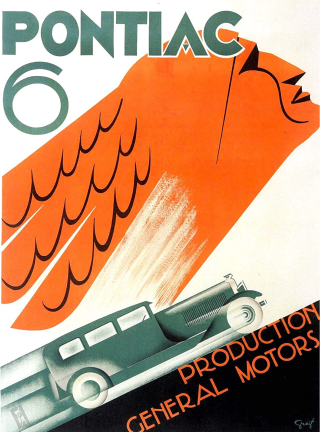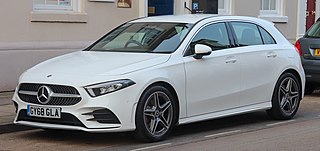
The Mercedes-Benz Group AG is a German multinational automotive corporation headquartered in Stuttgart, Baden-Württemberg, Germany. It is one of the world's leading car manufacturers. Daimler-Benz was formed with the merger of Benz & Cie., the world´s oldest car company, and Daimler Motoren Gesellschaft in 1926. The company was renamed DaimlerChrysler upon the acquisition of American automobile manufacturer Chrysler Corporation in 1998, and was again renamed Daimler AG upon divestment of Chrysler in 2007. In 2021, Daimler AG was the second-largest German automaker and the sixth-largest worldwide by production. In February 2022, Daimler was renamed Mercedes-Benz Group as part of a transaction that spun-off its commercial vehicle segment as an independent company, Daimler Truck.

The automotive industry comprises a wide range of companies and organizations involved in the design, development, manufacturing, marketing, selling, repairing, and modification of motor vehicles. It is one of the world's largest industries by revenue.

Gottlieb Wilhelm Daimler was a German engineer, industrial designer and industrialist born in Schorndorf, in what is now Germany. He was a pioneer of internal-combustion engines and automobile development. He invented the high-speed liquid petroleum-fueled engine.
Ballard Power Systems Inc. is a developer and manufacturer of proton exchange membrane (PEM) fuel cell products for markets such as heavy-duty motive, portable power, material handling as well as engineering services. Ballard has designed and shipped over 400 MW of fuel cell products to date.

Maybach is a German luxury car brand owned by and a part of Mercedes-Benz AG. The original company was founded in 1909 by Wilhelm Maybach and his son Karl Maybach, originally as a subsidiary of Luftschiffbau Zeppelin GmbH, and it was known as Luftfahrzeug-Motorenbau GmbH until 1999.

Magna Steyr GmbH & Co KG is an automobile manufacturer based in Graz, Austria, where its primary manufacturing plant is also located. It is a subsidiary of Canadian-based Magna International and was previously part of the Steyr-Daimler-Puch conglomerate.

The Mercedes-Benz A-Class is a subcompact car produced by the German automobile manufacturer Mercedes-Benz as the brand's entry-level vehicle. The first generation was introduced in 1997, the second generation (W169) in late 2004 and the third generation (W176) in 2012. The fourth generation model (W177), which was launched in 2018, marked the first time the A-Class was offered in the United States and Canada. This fourth generation A-Class is also the first to be offered both as a hatchback (W177) and sedan (V177).

MTU Friedrichshafen GmbH is a German manufacturer of commercial internal combustion engines founded by Wilhelm Maybach and his son Karl Maybach in 1909. Wilhelm Maybach was the technical director of Daimler-Motoren-Gesellschaft (DMG), a predecessor company of the German multinational automotive corporation Daimler AG, until he left in 1907. On 23 March 1909, he founded the new company, Luftfahrzeug-Motorenbau GmbH, with his son Karl Maybach as director. A few years later the company was renamed to Maybach-Motorenbau GmbH, which originally developed and manufactured diesel and petrol engines for Zeppelins, and then railcars. The Maybach Mb.IVa was used in aircraft and airships of World War I.

The Mercedes-Benz W221 is a chassis code of S-Class, the successor of the Mercedes-Benz S-Class (W220) and the predecessor of the Mercedes-Benz S-Class (W222). The S-Class are the flagship vehicles of Mercedes-Benz and each generation typically introduces a range of technical innovations and developments that over time will find their way into smaller cars.
BlueTEC is Mercedes-Benz Group's marketing name for engines equipped with advanced NOx reducing technology for vehicle emissions control in diesel-powered vehicles. The technology in BlueTec vehicles includes a selective catalytic reduction (SCR) system that uses diesel exhaust fluid, and a system of NOx adsorbers the automaker calls DeNOx, which uses an oxidizing catalytic converter and diesel particulate filter combined with other NOx reducing systems.

Beijing Benz is an automotive manufacturing company headquartered in Beijing, China, and a joint venture between BAIC Motor and Mercedes-Benz Group.

The F-Cell is a hydrogen fuel cell electric vehicle developed by Daimler AG. Two different versions are known - the previous version was based on the Mercedes-Benz A-Class, and the new model is based on the Mercedes-Benz B-Class. The first generation F-Cell was introduced in 2002, and had a range of 100 mi (161 km), with a top speed of 82 mph (132 km/h). The current B-Class F-CELL has a more powerful electric motor rated at 100 kW (134 hp), and a range of about 250 mi (402 km). This improvement in range is due in part to the B-Class's greater space for holding tanks of compressed hydrogen, higher storage pressure, as well as fuel cell technology advances. Both cars have made use of a "sandwich" design concept, aimed at maximizing room for both passengers and the propulsion components. The fuel cell is a proton exchange membrane fuel cell (PEMFC), designed by the Automotive Fuel Cell Cooperation (AFCC) Corporation.

Valmet Automotive is a Finnish vehicle contract manufacturer and supplier of battery, roof, and kinematic systems.
Hydrogen technologies are technologies that relate to the production and use of hydrogen as a part hydrogen economy. Hydrogen technologies are applicable for many uses.

The Mercedes-Benz Vito is a mid-sized light commercial vehicle (LCV) produced by Mercedes-Benz, available as a panel van, chassis cab, or multi-purpose vehicle (MPV), carrying cargo or up to eight passengers. In the Mercedes-Benz van lineup, it is positioned between the larger Sprinter and the smaller Citan.

A car, or an automobile, is a motor vehicle with wheels. Most definitions of cars say that they run primarily on roads, seat one to eight people, have four wheels, and mainly transport people, not cargo.
Mercedes-Benz, commonly referred to as Mercedes and sometimes as Benz, is a German luxury and commercial vehicle automotive brand established in 1926. Mercedes-Benz AG is headquartered in Stuttgart, Baden-Württemberg, Germany. Mercedes-Benz AG produces consumer luxury vehicles and light commercial vehicles badged as Mercedes-Benz. From November 2019 onwards, Mercedes-Benz-badged heavy commercial vehicles are managed by Daimler Truck, a former part of the Mercedes-Benz Group turned into an independent company in late 2021. In 2018, Mercedes-Benz was the largest brand of premium vehicles in the world, having sold 2.31 million passenger cars.

The automotive industry in Germany is one of the largest employers in the world, with a labor force of over 857,336 (2016) working in the industry.
Smart is a German automotive marque. Smart Automobile Co., Ltd. is a joint venture established by Mercedes-Benz AG and Zhejiang Geely Holding Group in 2019 and aimed at producing Smart-badged cars in China to be marketed globally. The venture is headquartered in Ningbo. It produces small battery electric vehicles in their manufacturing plant in China, while previously the marque was known to produce microcars and subcompacts, primarily the Fortwo and Forfour, at Smartville in Hambach, Moselle, France and in the Revoz plant. Its distribution, marketing and aftersales activities in Europe are currently handled by smart Europe GmbH which is headquartered in Stuttgart, Germany.














